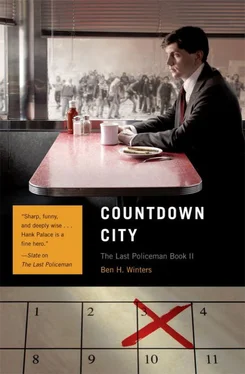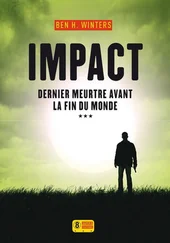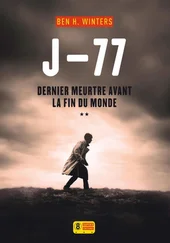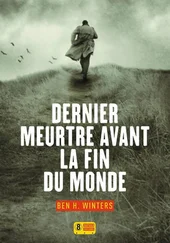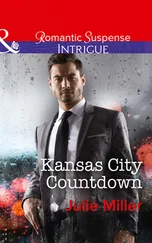* * *
Another scene from childhood. A few years after that spring, a few years before Jesus Man. Nico was nine years old and already she was sliding in and out of situations: insulting teachers, shoplifting small items. Stickers, cans of soda. A girl gave her beer, an older girl, probably as a joke, but Nico drank it all and was drunk—ten years old and drunk, and in her still-forming brain the alcohol was acting not as a goad to more bad behavior but as a truth serum, and she was muttering and sputtering, processing all kinds of anger toward me, toward Grandfather, toward everyone. “You will, though,” she said, when I tried to hug her, lift her, carry her home. “You will go away like they did. You’ll die. You’ll disappear.”
“I won’t,” I said to her. I said, “Nico, I will not do that.”
The rain has exhausted itself, for now, and the sky is clear and untroubled, the stars twinkling in their familiar places. I try to sleep but can’t; I can barely keep my eyes closed, lying restless on the floor of the India Garden, sprawled out uncomfortably with my backpack for a pillow. At dawn I will get back on the bike, get Houdini situated among my emergency supplies and water bottles, and leave for southern Maine.
Willfully I focus my thinking, put Nico and her friends and their tactics on a shelf in the back somewhere, pull a blanket down over Grandfather, who for some reason has been traveling with me all day today, emaciated and furious in his hospital bed with death crouching at his shoulders. I turn my head from everything and zero in on my case, my trip, my tomorrow.
So why are you doing it? Julia asked, as Nico had asked, as McGully had demanded of me. There are undoubtedly other ways I could be spending my time, performing actions of more tangible value to myself or others. But an investigation like this has its own force—it pulls you forward, and at a certain point it’s no longer profitable to question your reasons for being pulled. I stay up for a long time, blinking into the darkness of India Garden, thinking about Brett Cavatone.
He’ll ask me, too, if I find him, out there in the woods with his rifles. What are you doing here? Why have you come? And I don’t know what I’ll say, I really don’t.
PART FOUR
He’s Dead, He’s Dead, He’s Really Dead

Route 4 meanders eastward from Durham and then north-northeast along the line of the Piscataqua River, offering me a wide rolling view of Portsmouth Harbor: rusting lobster traps bobbing unattended; boats listing in their abandonment, paint peeling, hulls jutting out of the shallows.
It’s just me this time, bright and early and out on my mission. Detective Palace, retired, on his ten-speed with the dog hitched to the back in the little red wagon.
Cutts Neck—Raynes Neck—the long span of Memorial Bridge reaching high over the harbor. Then the series of roundabouts that spit you out onto 103 East. I know this route by pure sense memory from our handful of summers at York Beach, before the bottom fell out of my childhood. I roll past the big blue donut that had marked Louie’s Roadside Diner, now torn from its mooring by weather or vandals and lolling across the parking lot like a giant’s abandoned toy.
The sun is almost all the way up now, it’s close to nine, and I’m leaning into the curve of the third roundabout, navigating around the pits and gashes in the asphalt, speeding past the gates of Portsmouth Naval Station on the seaward side. I’m coming . The woods huddle in close against the road as 103 crosses the border and cuts into southeastern Maine, gives up its last pretense of being a highway and settles down into a crooked little two-lane road with a faded yellow line down the middle.
Here I come .
* * *
Fort Riley, when I find it, sits on the northern lip of Portsmouth Harbor, a castle keep built on a cliff wall, staring out at the sea. For a couple hundred years it was an active United States Army fort, minding the coast during the Revolution, the War of 1812, all the way up to World War II, when civil reserves in green helmets would sit in seaside redoubts like this one, up and down the coast, peering out at the northern Atlantic for U-boats. For half a century Riley was a state park and historical site; now it’s where Brett Cavatone, my missing man, has come to make camp. I turn off the highway into the parking lot, a long narrow spit of gravel with dense woods to the left and, to the right, the high tumbling stone wall of the old fort itself.
I get off the bike and lift Houdini from the wagon and set him down in the gravel. My chest is thick with anticipation. The air smells like the sea. He’s here, I’m thinking. This is it. Hello, sir. My name is Henry Palace .
I walk slowly down the length of the parking lot, hands out of my pockets and slightly raised, a picture of harmlessness, in case anyone is watching—anyone with a pair of sniper rifles and reason to be wary of visitors. There’s one car in the lot, a gray Buick LeSabre with Quebec plates and all four tires shot out. In the backseat, a teddy bear and an Uno deck. The entrance to the fort is all the way at the end of the parking lot, an arched doorway just where the stone wall bends away to the south and the gravel ends in grass and weeds. Farther on is the ocean.
Put down your weapons, sir. Your wife would like you to come home .
“Okay,” I say, to no one, or to the dog I guess, but then I see that he’s decided to stay back by the bicycle. I turn around and he’s way back up there where the parking lot begins, skittering back and forth between the chained-up ten-speed and our supply wagon. I gesture to my right, around the corner of the wall, into the fort proper.
“You coming?”
Houdini doesn’t answer. He growls uneasily, sniffs at the ground. “All right,” I tell him. “You stay there.”
The buildings of the fort, half a dozen tottering stone piles and decomposing wooden ruins, are scattered over one big uneven hill—an acre or acre and a half of muddy grassland, sloping down toward a cliff over the water. The layout is as haphazard as might be expected of a centuries-old military campus, built piecemeal by different commanders at different times for different purposes. It’s all centered around one structure, though: the blockhouse, a wooden tower on a sturdy granite base, rising high above the center of the fortland like a birthday cake. The blockhouse could be somebody’s tidy colonial house, a charming white-sided vacation home overlooking scenic Portsmouth Harbor, except that it’s perfectly octagonal and slitted all around its eastern faces with narrow rifle ports, for spotting incoming ships and shooting at them.
I shade my eyes and look up at the narrow windows. He might be up there. He might be in any of these buildings. Cautiously I pick my way through the mud and seagrass, over the foundation stones like flat gravestones, alert for the presence of Brett.
The rifleman’s house is a square red-brick building, as small as a one-room schoolhouse. A cornerstone announces the structure’s provenance of 1834, but there is no roof; maybe it was never completed, or maybe the tiles were repurposed by the army when this fort was decommissioned, or maybe they were stripped last month by looters and carted away like Sergeant Thunder’s brick shed.
I linger there in the roofless shelter. This then will be the shape and the feel of the world: an abandoned shell, signs of old life, curious animals wandering in and out of ruins, the wilderness crowding in, overtaking all human structures and human things. In fifty years, everything will look this way, desolate and quiet and overgrown. Not even fifty years—next year—by the end of this one.
Читать дальше
